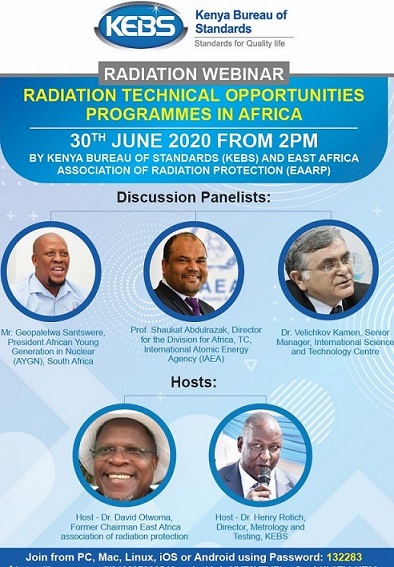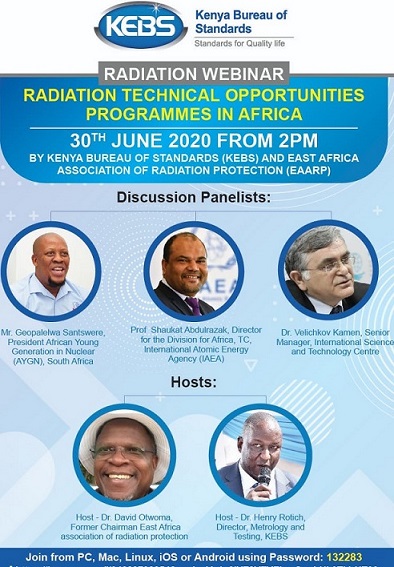ISTC takes Part in a Kenya Bureau of Standards Webinar for African Partners

 At the invitation of Dr Henry Rotich, Director, Kenya Bureau of Standards (KEBS) and Dr David Otwoma, former Chairman, Eastern Africa Association of Radiation Protection (EAARP), ISTC took part in a webinar entitled Radiation Technical Opportunities Programmes in Africa that attracted the attention of more than a hundred and twenty nuclear experts from Kenya and other African states.
At the invitation of Dr Henry Rotich, Director, Kenya Bureau of Standards (KEBS) and Dr David Otwoma, former Chairman, Eastern Africa Association of Radiation Protection (EAARP), ISTC took part in a webinar entitled Radiation Technical Opportunities Programmes in Africa that attracted the attention of more than a hundred and twenty nuclear experts from Kenya and other African states.
Inaugurating the event on 30 June, Dr Henry Rotich appealed to the participants to help map better solutions for peaceful nuclear applications in the country and the East African region. He called for identification of an IAEA- designated centre in Kenya, for which the KEBS could serve as the backbone.
KEBS maintains good partnership relations with ISTC, which supported KEBS seminars and other initiatives. On KEBS’s invitation ISTC Senior Management delegation, led by Ambassador Ron Lehman, the Chairman of the Governing Board, visited Kenya a year ago to advocate at various line ministries the adhesion of the country to ISTC, and to encourage potential stakeholders in that partnership.
Dr David Otwoma, who mediated the webinar, is the Chief Analyst and deputy Director of the National Commission for Science, Technology and Innovation (NACOSTI), the Kenyan government institution under the Ministry of Education and Science, that became a Party to ISTC, following the ISTC Management visit to Nairobi. He is also a resource person for the EU-funded ISTC -implemented projects in Africa.
The views of the young professionals in the nuclear field were aired by Geopalelwa Santswere from South Africa, the President of the African Young generation in Nuclear (AYGN), a continental affiliate body to the International Youth Nuclear Congress, with chapters in RSA, Kenya, Zambia, Rwanda and other countries. Mr. Santswere recalled that AYGN works through its national networks to demystify nuclear technology and educate the public about benefits of nuclear applications. AYNG also facilitates knowledge transfer and skills development from current generation of leading nuclear experts to the young generation of nuclear professionals.
ISTC has supported AYGN’s Inaugural (2017) and Second African Youth Summits (2019), and collaborated with it over the conduct of the International Integrated Workshop on Nuclear Advocacy and Communication (Nairobi, November, 2017) and the Conference on Enhancing Africa’s Capacity on Nuclear Safety, Security and Safeguards in SADC Countries (Lusaka, August 2018).
During the webinar, considerable interest arose the presentation Non-Destructive Testing for Sustainable Industrialization in Africa: Support Through IAEA Technical Cooperation, by Prof. Dr Shaukat Abdulrazak, Director, Division for Africa, IAEA. He pointed out that the science of using non-invasive methods to determine the integrity and properties of a material or components is a vital element of quality assurance during industrial manufacturing. He also highlighted the achievements of regional projects on NDT, exemplified by the increased number of available NDT experts in Africa and the rising analytical capacities of existing NDT facilities strengthened through provision of equipment. The AFRA Regional Designated Centres (RDC) in Tunisia, Morocco and RSA play a leading role, which is why the call by KEBS to set up a RDC in Kenya is justified. Kenya implemented several projects on NDT and achieved considerable progress through capacity building and infrastructure development. The ongoing project in Kenya aims to put in place a system of education, training, qualification and certification and is likely to take the NDT practice to the next level through including NDT personnel qualification and certification schemes and increased capacities for calibration of NDT equipment.
In his remarks Prof. Dr Shaukat Abdulrazak referred on several occasions to ISTC as IAEA’s reliable partner in Africa, as illustrated through joint training courses and other activities often also involving the African Commission on Nuclear Energy (AFCONE).
It was about the ISTC-implemented projects and activities in various parts of Africa that Dr Kamen Velichkov, ISTC Senior Program Manager and Diplomatic Advisor, talked during the KEBS webinar. He highlighted that ISTC is being expanding already established partnerships sparing no efforts to help several African countries and organizations to better prepare for the advent of greater peaceful nuclear applications and to spread higher levels of nuclear culture among the scientific and professional communities and other stakeholders. In this regard, ISTC is a prime vehicle for knowledge and technology transfers, as well as a platform to share and exchange ideas, and to network on issues related to nuclear science and technology in Africa and globally.

